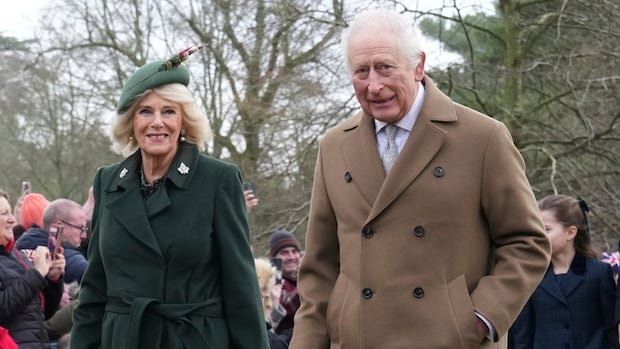King Charles used his annual Christmas message to pay tribute to the selflessness of those who have looked after him and the Princess of Wales this year as they both received cancer treatment.
The 76-year-old monarch said in a pre-recorded message released Wednesday that he and his family are “continually impressed” by those who dedicate their lives to helping others.
“From a personal perspective, I would like to express my special, heartfelt thanks to the selfless doctors and nurses who have supported me and other members of my family this year through the uncertainties and fears of the disease and helped provide the strength, care and comfort “We have.” “I needed it,” he said in a recorded speech.
The broadcast came several hours after the monarch waved to a large crowd who traditionally gathered to watch the royal family attend the Christmas service at a church in Sandringham, the estate on the windswept North Sea coast that has served as a family retreat for generations.

A year marked by illness in the royal family
The king’s Christmas speech is the third since his accession to the throne following the death of Queen Elizabeth II in September 2022, but the first since he was diagnosed with an unknown form of cancer in February.
The monarch’s holiday message is being followed by millions of people across the UK and across the Commonwealth, with many households planning Christmas dinner around it.
The king’s ongoing treatment forced him to forego public appearances for two months. He has slowly returned to public life in recent months and was in good spirits on a tour of Australia and the South Pacific in October.
A few weeks after Charles began treatment, the Princess of Wales announced her own cancer diagnosis, which sidelined her for much of the year.
In a voiceover for her annual carol service at Westminster Abbey, recorded this month but broadcast on Tuesday night, Catherine also reflected on the love and support she received.
“The Christmas story encourages us to think about the experiences and feelings of others,” she said. “It also reflects our own vulnerabilities and reminds us of the importance of giving and receiving empathy and how much we need each other despite our differences.”
Charles spoke at the Fitzrovia Chapel in central London, which was part of the now demolished Middlesex Hospital, where his first wife Diana opened London’s first dedicated ward for AIDS patients.
The king had tasked the team organizing the broadcast with finding a location away from the royal estate, one with health connections, a strong presence in the community and a place of comfort and reflection for people of faith and without.
Charles accompanied Queen Camilla, while his eldest son, Prince William, Catherine and their three children followed. The king’s daughter-in-law, who has slowly returned to public duties after completing chemotherapy, hugged a cancer patient after the service.
Two of Charles’ siblings, Anne, the Princess Royal, and Prince Edward, the Duke of Edinburgh, were also in the procession.

Prince Andreas was particularly absent from St. Mary Magdalene Church. The king’s 64-year-old brother, once second in line to the British throne, has become a constant source of tabloid press because of his money problems and his connections to questionable figures, including the late American financier and convicted pedophile Jeffrey Epstein.
Most recently, a Chinese businessman was refused entry to the UK over fears he had cultivated ties to Andrew on behalf of the Chinese Communist Party.
Message for those enduring “devastating” conflict
It is rare that the monarch’s Christmas message is not recorded at a royal residence, particularly Buckingham Palace or Windsor Castle. The last time his late mother recorded her message outside the royal estate was in 2006.
Charles also paid respect to the World War II troops who died on the beaches of northern France and to the few remaining veterans, many of them centenarians, who took part in the 80th anniversary of the D-Day landings in Normandy in June.
He said it was a “huge privilege” to “meet the remarkable veterans of this very special generation who have stood up so bravely for all of us” but that the specter of war had haunted the world this Christmas.
“At previous commemorations, we could console ourselves with the thought that such tragic events rarely happen in modern times,” he said.
“But on this Christmas Day we must remember those for whom the devastating impact of conflict in the Middle East, Central Europe, Africa and elsewhere poses a daily threat to the lives and livelihoods of so many people.”





